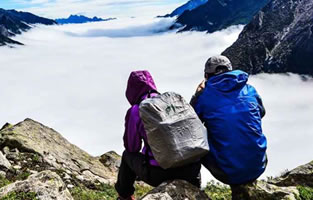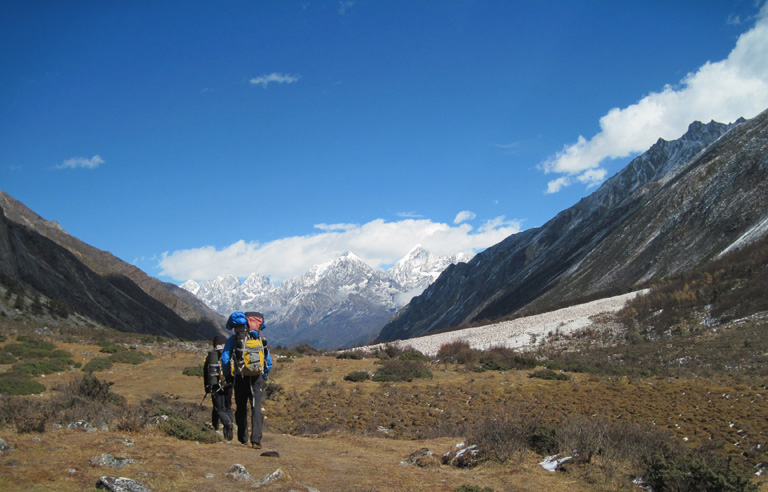Chengdu
Hometown of Pandas
Jiuzhaigou
Famous Fairyland
Emeishan
Sacred Buddhist Site
Leshan
Giant Buddha
Gonggashan
Best for Hiking
Daocheng Travel
Shangri La Views
Dujiangyan
Irrigation System
Siguniangshan
Eastern Alps
Traveling to high altitude regions of Sichuan is an incredible experience, but it also poses certain challenges that can be harmful to your health. One of the most common challenges is mountain sickness, also known as altitude sickness. It is a medical condition that can affect anyone who travels to high altitudes. However, with some precautions and preparations, you can minimize your risk of developing mountain sickness while traveling in the high altitude places of Sichuan.
Hiking in Sichuan involves walking at high elevations at over 4000 meters. Hikers will need to be aware of your own condition to avoid mountain sickness while hiking. Most part of western Sichuan where the beautiful mountains and parks such as Mt. Siguniang, Minya Konka, Kandging and around, Daocheng Yading are at very high altitude over 3500m and even over 4000m some near 5000m. For first time hikers to Sichuan to do the hiking, it is better to consult your doctor before you go. People with cardiac or lung problems are not recommended to trek in high altitude places. And even for experienced hikers, it is also important to watch yourself for mountain sickness.
For a hiking trip in Sichuan it is always better to have precautions to avoid mountain sickness than to deal with mountain sickness when you have it. Suggestions in terms of trying to avoid mountains sickness while hiking in Sichuan include having a necessary acclimatization overnight/overnights at a lower elevation, to drink a lot of water (more than you actually need) for the first two days, to keep warm all the time and do not catch a cold. Also you had better to be careful of what you eat and avoid eating too much or too less. Be careful of the Alcohol you take and try not to get drunk as well.
Acclimate Gradually
One of the most important steps in avoiding mountain sickness is to acclimate gradually. The higher you go, the thinner the air becomes, and your body needs time to adjust to the lower oxygen levels. Acclimatization means giving your body enough time to adapt to the change in altitude.
If possible, plan your itinerary to allow for a gradual ascent. It is generally recommended that you don't ascend more than 500 meters per day. Also, plan to spend a few days at an intermediate altitude to give your body more time to adjust. A gradual arrival to the hiking place is recommended to extend your acclimatization time. So it is more helpful to use ground transfer than to use flight in general.
Stay Hydrated
Staying hydrated is essential at high altitudes. At higher elevations, the air is drier, and you may not feel thirsty, but your body still needs water. Dehydration can exacerbate mountain sickness, so make sure you drink plenty of fluids, especially water. Avoid drinking alcohol, which can further dehydrate your body.
Eat Light and Nutritious Foods
Eating light and nutritious foods can help you avoid mountain sickness. Avoid overeating or consuming heavy, greasy foods. These can make you feel sluggish and make it harder for your body to adjust to the altitude. Instead, focus on light, nutritious foods that are rich in carbohydrates and low in fat. Carbohydrates are an excellent source of energy and help your body adjust to the altitude. Fruits, vegetables, and whole grains are good choices.
Take it Easy
When traveling to high altitudes, it's important to take it easy and not overexert yourself. Your body needs time to adjust, and pushing yourself too hard can exacerbate mountain sickness symptoms. Take frequent breaks and rest as needed. Stress can also cause mountain sickness. While walking, a shortage of breath you feel is normally. It is essential to accustom yourself and find your own pace while hiking.
Avoid Smoking
Smoking is never good for your health, but it can be especially harmful at high altitudes. Smoking can decrease the amount of oxygen in your body, making it harder to adjust to the lower oxygen levels at higher altitudes. If you smoke, it's best to quit or avoid smoking altogether during your trip.
Consider Medication
In some cases, medication can help prevent mountain sickness. Consult with your doctor before your trip to see if you are a good candidate for altitude sickness medication. Medications such as Acetazolamide (Diamox) can help reduce the symptoms of mountain sickness, but they are not a substitute for proper acclimatization. The local herbal medicines are also good options but they are less effective as diamox.
Stay Warm and Be Prepared
Being prepared is essential when traveling to high altitude regions. Make sure you bring warm clothing, including a hat and gloves, as temperatures can drop rapidly at night. Also, make sure to bring a first-aid kit that includes medication for headaches, fever, and stomach problems.
While camping you may have to go through nights without shower but to wash yourself in the river is not considered a good idea because the water in the river is normally very cold even in the summer time in western Sichuan.
Watch for Symptoms
It's essential to be aware of the symptoms of mountain sickness. Symptoms can include headache, nausea, fatigue, and difficulty sleeping. If you experience any of these symptoms, it's important to take action. Rest, drink fluids, and descend to a lower altitude if necessary. Severe symptoms such as confusion, shortness of breath, and chest pain require immediate medical attention.
A critical sympton of mountain sickness is that when you do not want to eat but just to lie down plus usually a severe headache. This is when you need to be careful and make decisions for evacuation. But if you are not aware of this or if you think this is not mountain sickness, it is not safe. Thus it is important that you have a partner to hike with you. So it is always safer to hike with someone else or in a group than doing it alone.
But remember a slight or medium headache is normal to any hikers, which could happen to anyone. Depends on each one’s physical condition and experience, you make the decision of your next move after someone gets mountain sickness. A serious mountain sickness will usually result into a swelling up of your head and even your body, that is when you need to go down to a lower place . A critical mountain sickness is the hiker will fall into a coma and that is when the hiker’s life is in danger. So for mountain sickness, if we are aware of it and prepare our bodies properly, it will minimize the danger and trouble. And when someone is suffering mountain sickness, we need to take actions quickly too avoid worse results.
 Most Hiking in Sichuan are at High altitude of around 3000m to 4000m
Most Hiking in Sichuan are at High altitude of around 3000m to 4000m
It's important to note that mountain sickness can affect anyone, regardless of age, fitness level, or previous experience with high-altitude travel. Therefore, it's essential to take the necessary precautions and listen to your body if you experience any symptoms. In summary, if you're planning a trip to a high altitude region of Sichuan, make sure to do your research and prepare accordingly. By following the tips and guidelines outlined in this article, you can increase your chances of a safe and enjoyable trip. Remember, prevention is key, so take it easy, stay hydrated, and give your body the time it needs to adjust to the altitude. With the right mindset and preparation, you can have a wonderful experience and create lasting memories while hiking in Sichuan.

Route: Chengdu - Mount Siguniang

Route: Chengdu - Kangding - Danba - Chengdu

Route: Chengdu - Mount Gongga - Chengdu